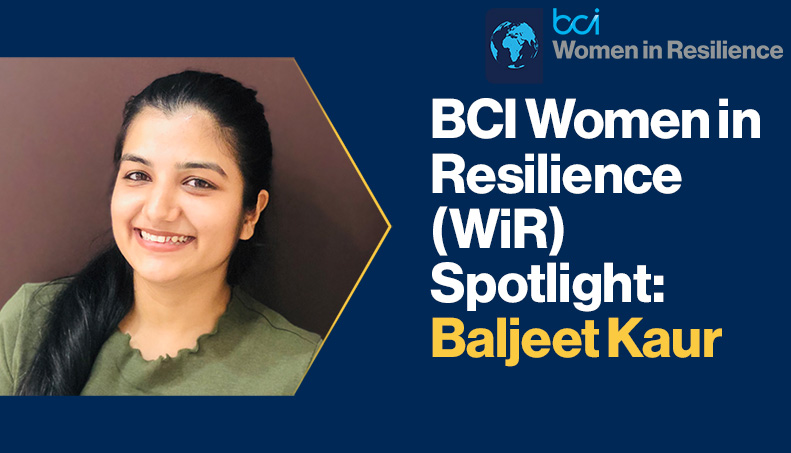BCI Women in Resilience (WiR) Spotlight: Baljeet Kaur

Baljeet Kaur CBCI started her career in resilience in 2023 and holds a double master’s in Risk Management from University College London and TISS, Mumbai. As a biology student who grew up in New Delhi, Baljeet says that she initially found the resilience industry to be unique and fairly alien. However, a shift to disaster management in 2017 prompted her to explore the field and understand the various career opportunities that lay within it.
“I was extremely intrigued about the concepts of vulnerability, risk, and continuity when I first encountered them,” says Baljeet. “My first master's programme piqued an interest in the global debates on resilience.”
Following this, Baljeet worked in community risk management for two years before deciding to move countries and apply for an M.Res in Risk and Disaster Reduction at UCL. She adds that the year at UCL was a major factor in motivating her to join the industry.
On the other hand, Baljeet notes that being an international student came with certain challenges. She had decided to work in business continuity and organizational resilience while pursuing the master's, since she found it interesting and it aligned with her skill sets. However, it took Baljeet almost a year to find a role where she could apply the knowledge that she had acquired throughout her academic journey.
“There were sponsorship related challenges, which could be extremely taxing, in addition to job rejections. I realised that it was important to gain experience in the UK as that provided a higher exposure and diverse experience,” says Baljeet.
Indeed, Baljeet found that moving countries played a significant factor in her professional growth. While being fairly new to the industry, she found a series of great mentors in the form of her professors, peers, and now, colleagues. Baljeet is now working in a global role, something she says has been “an exciting and experiential journey.”
“Understanding different cultures and perspectives have been key in shaping up how I approach my work,” adds Baljeet. After attending workshops, webinars, and participating in broader research for the BCI, she also notes the importance of networking and engaging with the developments in the industry. “I recently participated in the APAC launch of the BCI Technology in Resilience Report as a panellist, which proved to be a great learning experience.”
Adding to this, Baljeet highlights how important communication, management, and analytical thinking skills are in this industry. “In my limited, yet enriching, experience, I have observed that being able to participate in the resilience discourse within the organization and the wider industry is essential. More than anything, it is important to network and participate in the growth of the sector.
Looking ahead
Looking ahead, Baljeet explains that the BCI Women in Resilience (WiR) Special Interest Group provides a voice for women working in resilience, and that she “believes it will be critical in providing a platform for young professionals to learn from the experiences of leaders who look like them and have faced challenges like they do today.”
She explains that the group helped tremendously when she was looking to step foot in the industry, while noting the importance of being able to engage with mentors and learn from their journeys.
Regarding what can be done to improve the industry, Baljeet says that the profession could benefit from a more collaborative approach, since there are shared themes within BC and resilience. Therefore, if practitioners shared their learnings, this could facilitate continuous improvement. “I would also love to see a more diverse pool of people working in the field of resilience, as all of us bring our shared experiences to our approach and we’ve got so much to learn from each other,” says Baljeet.
Elsewhere, Baljeet also calls for more people to join the field, saying that organizations need individuals who can bring their own unique perspective to deal with the uncertainties that organizations are currently facing.
“Resilience needs to be the core of strategic decision making and that can be brought forward by professionals who understand the field well and are passionate about building progressive organizations,” adds Baljeet.
How does being a member of the BCI help?
Baljeet also considers the benefits that being a member of the BCI brings, such as the opportunity to learn more about the industry, as well as getting access to articles, reports, and industry innovations (including content only available for members).
“BCI Membership allows you to utilise mentorship opportunities, which can facilitate your professional journey and help you to learn from experts and build your network. The community also benefits from the experiences of the members and encourages a collaborative environment for a diverse group of individuals. It is a wonderful platform for newcomers and experienced professionals, allowing knowledge transfer globally,” concludes Baljeet.


